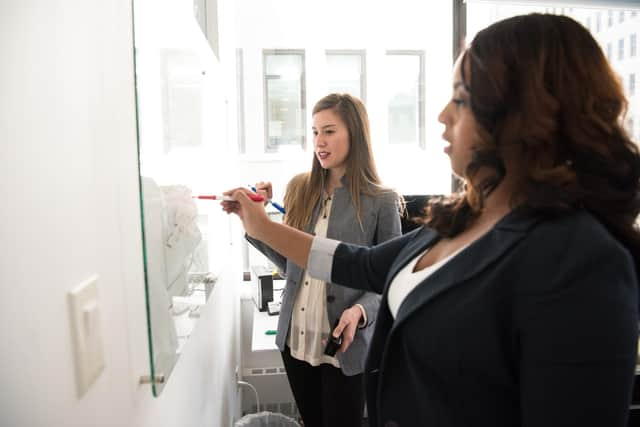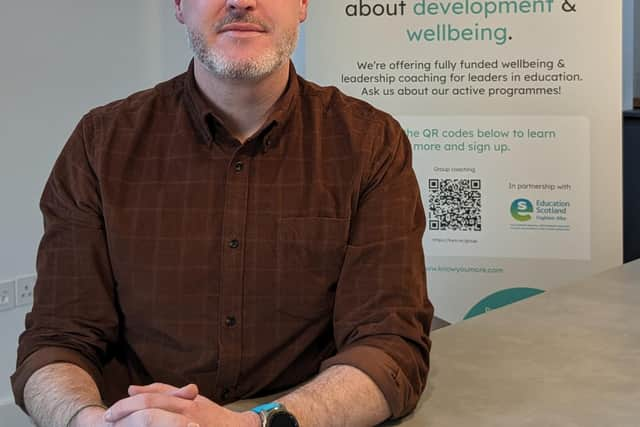Education Scotland: How coaching is helping to unleash the talents of young Scots through Know You More 'Robin Hood' model
Coaches, in the minds of many people, tend to be tracksuit-clad, middle-aged men who shout instructions to overpaid sports stars from a touchline.
However, in the world of business, and the public sector as well, coaching is increasingly seen as a vital tool for developing and unleashing talent.
Advertisement
Hide AdAdvertisement
Hide AdThis has been true for a long time at a leadership level, but a small Scottish social enterprise is now finding ways to offer the same opportunities to younger generations, and other professionals, such as teachers.


“Know You More” is a ten-strong team working mostly out of Edinburgh and Kinross, but bringing together 250 coaches from across the UK.
Tim Mart, co-founder and chief executive officer, previously worked in the financial services industry, but wanted to provide guidance to others, like himself, who encounter difficulties during their younger years.
"When I was in that 18 to 25-year-old age group, that was an area of my time I think when I really kind of struggled,” he told The Scotsman. “[There were] personal things like my father passing away, and what I know now is that I had ADHD as well.
"So when I went in and worked my way up the ladder, and got that opportunity to work with a coach, I was like ‘I want to do this for other people’.


"I wasn’t so driven by the idea of coaching more leaders within corporates. It was actually ‘how can we help the next generation tackle the complex obstacles they face just now and give them the leadership skills early on, and help them through a period I personally struggled in?’”
Know You More began life in 2015/16, pioneering coaching for younger age groups, particularly through online conferencing tools, which have now become commonplace since the pandemic.
Mr Mart said: "Professional coaching is typically held for leaders, they tend to receive it quite late on in their career. So we were like ‘how can we bring that forward to help the next generation of leaders coming through receive coaching and get more clarity about what they do?’
Advertisement
Hide AdAdvertisement
Hide Ad"And the way we decided to do that was by using video. The younger generation is much more akin, and maybe have a greater preference, to use video than meet face to face. Could we take geography out of the equation, get coaches together from around the UK, and then provide them with free, one-to-one coaching, and do it that way?
"That is how we started off in 2015/16. We did a lot of work with universities, the University of St Andrews etc, supporting their young people.
“And then as a young company we needed to be more sustainable, so we made a pivot and realised that we had actually created something. We had developed a platform – this massive community of coaches across the world – that would actually help organisations deliver coaching better within their companies, and make it less expensive, less taxing on resources.
"We now have this really nice kind of Robin Hood model, or inclusive growth model as the Scottish Government might say, where we deliver coaching into organisations which is paid for. That’s our commercial revenue that comes in, and then that supports us to do our free activity for young people.
"Specifically for 18 to 25-year-olds, all of the work we do is for free. And then we have partnerships with charities and universities and things like that to try and reach that age group and support them in their development.”
Unlike in sports, the type of coaching Mr Mart is describing is “nondirective”.
The qualified and accredited coaches use questions and feedback to help people see things through different perspectives, with the basic premise being that “we all know more than we think we know”.
Mr Mart said: "In the epidemic of busyness that we all have, the opportunity to just stop – stop all the doing, and do some strategic thinking about ourselves, what we want to do and what is important to us, to focus on our wellness and things like that – is really important.”
Advertisement
Hide AdAdvertisement
Hide AdWith its emphasis on video-based coaching, the social enterprise was well placed to help the Scottish Government and its agencies when services were forced to quickly move online during the Covid-19 pandemic.
"During the pandemic we started working with NHS Education for Scotland, and then that led to working with Education Scotland, primarily because that was a time when everything went digital, and they needed to find a way to support their workforce,” Mr Mart said.
"So we created this nice, short, sharp wellbeing coaching model, that would enable them to reach people wherever they were in the workforce."
Initially, the platform was used to help senior teachers and leaders with the shift to online lessons, when schools were closed to prevent the spread of the coronavirus.
"We did a lot of work in that leadership space working with deputes, head teachers, people in childcare provisions, and it has been nationwide, all across Scotland,” he said.
"That was hugely successful and then the Scottish Government got in touch this year because they really wanted to focus on the wellbeing of education practitioners, and to create a nationwide offer for anybody at any level in the system to access this kind of one-to-one coaching.”
A £200,000 programme is now providing 1,250 hours of free-to-access wellbeing coaching to more than 500 Scottish school staff.
“They’ve got a really good strategy around coaching in Education Scotland, and it is something that they have believed in for a long time,” said Mr Mart. "Across the public sector actually, coaching is something that is kind of huge. But it is about how do you make it possible."
He added: "It will all come down to resources and budgets and all that, but hopefully the data will show that it is certainly worth the investment.”
Comments
Want to join the conversation? Please or to comment on this article.
